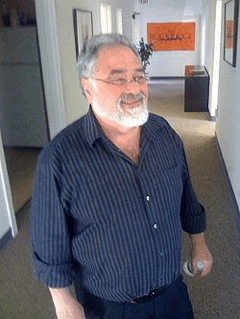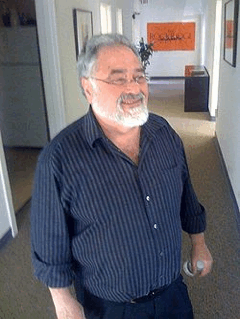Framing the Anything But Climate Debate
Air Date: Week of October 30, 2009
George Lakoff is a Democratic political strategist: (Photo by: Dave Winer)
The Senate recently rolled out new legislation to limit greenhouse gas emissions. It’s called The Clean Energy, Jobs and American Power Act and two words are noticeably absent: climate change. Host Steve Curwood speaks with long-time Democratic strategist and linguist George Lakoff about the decision to frame the climate change bill as anything but the climate change bill.
Transcript
CURWOOD: It’s Living on Earth, I’m Steve Curwood.
YOUNG: And I’m Jeff Young. If you’re interested in the climate change legislation currently on Capitol Hill, don’t try the phrase “climate change” in your text search, or “global warming”, you won’t find those words in the titles. The House-passed version is the American Clean Energy and Security Act, the Senate’s considering the Clean Energy Jobs and American Power Act.
CURWOOD: With the big UN climate change meeting coming in Copenhagen in December, Democratic leaders are eager to find the right words to sell their approach both at home and abroad. That’s the sort of word-smithing they often get from George Lakoff, the Berkeley linguist and the long time Democratic strategist. Professor Lakoff, please explain why democrats think they can pass a climate change bill when the words “climate change” are barely mentioned?
LAKOFF: Well, the easiest way to think about this is what the Pew Foundation found when it did its latest poll, which is that fewer people quote – believe - that climate change is real and caused by human beings, and as a result the administration has decided not to worry about that, not to take that on and have the debate over whether it’s real, but to just assume it’s real and go on.
CURWOOD: Okay, that Pew poll is just one poll though, so what else is really guiding this framing decision? You know, one of our producers here said, this discussion is being framed with an absent center; it’s like a donut we’re walking around here.
LAKOFF: That’s absolutely right, and you might ask another question: Why should the Pew poll result have come, why should fewer people believe in the reality of global warming and climate change? And the answer to that is that the conservative message machine has been going night and day on this while the Democrats have been talking about health care. So, the public, in at least independent and republican districts, have heard all over, over and over again, that you know, this isn’t real. So, they decided not to debate that and they’re just going to go ahead and play their cards, the cards that they think will get a bill passed.
CURWOOD: In your view, what are the odds that this bill is going to succeed? Some people would say, oh, we’re going to have to count it out now.
LAKOFF: I don’t see it succeeding before Copenhagen, and I think that’s part of the administration’s ideas. I think what they want is to go to Copenhagen with bipartisan support for something or other, and if they have something or other that they can claim is a victory, then they have some moral authority in Copenhagen.

George Lakoff is a Democratic political strategist: (Photo by: Dave Winer)
CURWOOD: So, Mr. Obama walks into Copenhagen with perhaps, what? Some sort of agreement, some sort of committee passage of legislation, and the House has passed something. How do you frame that as progress enough to convince the international community that the US is really serious about dealing with climate change?
LAKOFF: You say, we are about to pass a bill, we have a slow democratic process, but it is happening. You pick out the parts of the bill that look the best and you put them forward, and you say, we’re going to do this, we’re going to pass the bill, we’re going to make it better over the years, and we want to work with you. Very simple. That’s what he’s going to say.
CURWOOD: And if President Obama were to choose not to go to Copenhagen, how could he frame that for the world and for America?
LAKOFF: I think he couldn’t. I don’t see it any possibility of his not going to Copenhagen, it just looks so bad both nationally, where he’s saying I can’t lead – he looks weak – and internationally, he looks weak.
CURWOOD: So, George Lakoff, you’re a linguist, you understand how we communicate with each other. What is it about the human condition that makes it so hard to talk about a slow moving, yet as science tells us, ultimately a deadly phenomenon known as climate disruption?
LAKOFF: Linguists have studied languages all over the world, and every language has a way to express causation, but that causation is always direct. It’s like, you know, I pick up this cup of coffee, that’s direct causation. Climate change isn’t like that. It happens all over the world, it’s a matter of a system – a system working because that is the central problem. People think in terms of a direct causation, the phenomenon is systemic causation.
CURWOOD: So, here’s a question: What language is better suited for communication systemic causation? Or is this part of the human condition?
LAKOFF: It’s part of the human condition. There’s no language better suited for speaking of systemic causation. They all have direct causation.
CURWOOD: And I suppose it is a human condition, right? I mean it’s very hard to link the extra item on one’s plate to something that appears around our waist, or handing over the credit card and the bill that will arrive later in the mail.
LAKOFF: You’ve got it, and moreover, the same problem is there the economy. You have short-term greed, and the assumption is that short-term greed is good. If everybody around the world is greedy in the short term then we’ll all be better off. We have the same problem in both the ecology and the economy. Short-term greed has created the problem over a very long time all over the earth, and we don’t have a comprehensive way of thinking about systemic risk and systemic causation.
CURWOOD: Democratic strategist George Lakoff teaches at the University of California, Berkeley. Thank you so much, George, for taking this time.
LAKOFF: It’s always a pleasure to be here.
Links
A Pew poll says that less Americans are convinced about the realities of global warming.
Living on Earth wants to hear from you!
Living on Earth
62 Calef Highway, Suite 212
Lee, NH 03861
Telephone: 617-287-4121
E-mail: comments@loe.org
Newsletter [Click here]
Donate to Living on Earth!
Living on Earth is an independent media program and relies entirely on contributions from listeners and institutions supporting public service. Please donate now to preserve an independent environmental voice.
NewsletterLiving on Earth offers a weekly delivery of the show's rundown to your mailbox. Sign up for our newsletter today!
 Sailors For The Sea: Be the change you want to sea.
Sailors For The Sea: Be the change you want to sea.
 The Grantham Foundation for the Protection of the Environment: Committed to protecting and improving the health of the global environment.
The Grantham Foundation for the Protection of the Environment: Committed to protecting and improving the health of the global environment.
 Contribute to Living on Earth and receive, as our gift to you, an archival print of one of Mark Seth Lender's extraordinary wildlife photographs. Follow the link to see Mark's current collection of photographs.
Contribute to Living on Earth and receive, as our gift to you, an archival print of one of Mark Seth Lender's extraordinary wildlife photographs. Follow the link to see Mark's current collection of photographs.
 Buy a signed copy of Mark Seth Lender's book Smeagull the Seagull & support Living on Earth
Buy a signed copy of Mark Seth Lender's book Smeagull the Seagull & support Living on Earth


